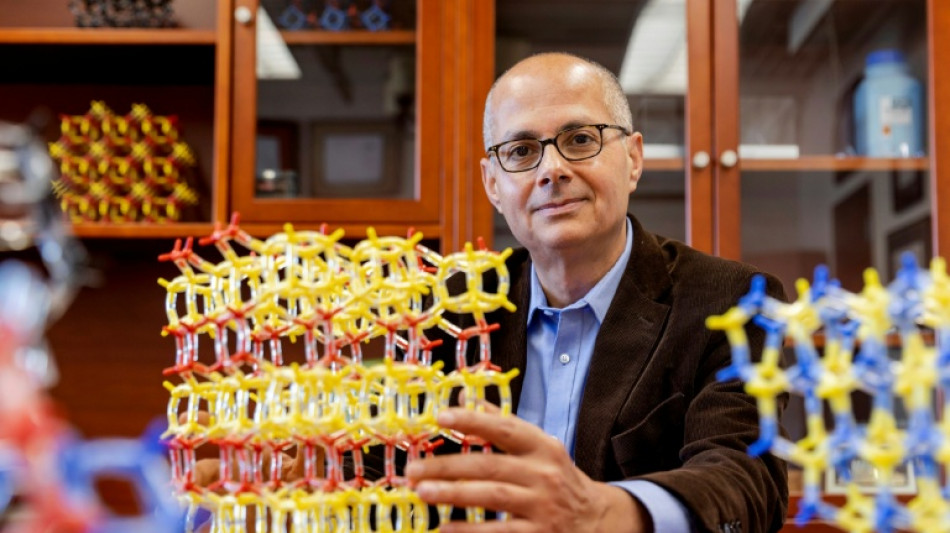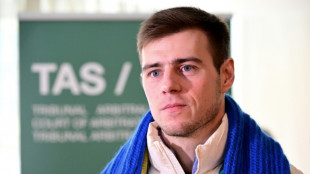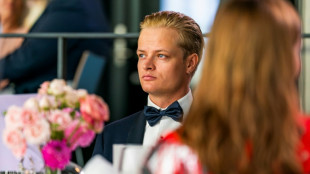
From refugee to Nobel: Yaghi hails science's 'equalizing force'

Nobel chemistry laureate Omar Yaghi was born to Palestinian refugees in Jordan, a quiet, studious child in a "large, rowdy family" that shared a single room with cattle they raised.
Which made Wednesday's news that the chemist at the University of California, Berkeley was among 2025's class of Nobel winners all the more emotional, Yaghi told journalists as he heralded the US public school system he said he is a product of.
He also emphasized that publicly financed education and research have been key to his career, at a moment when US President Donald Trump is upending the long-standing funding structures that undergird the work of universities.
"This recognition is really a testament of the power of the public school system in the US that takes people like me with a major disadvantaged background, a refugee background, and allows you to work, and work hard, and distinguish yourself," Yaghi said.
He described how his parents spent "every minute of their time dedicated to their kids and to their kids' education, because they saw that as a way to lift themselves and the kids out of challenging situations."
Their home had no electricity or running water. His father had finished school through sixth grade and his mother could neither read nor write.
"We didn't have a lot of the conveniences that many others do, but we had a lot of love and a lot of care," the scientist said.
Yaghi won the 2025 prize together with Susumu Kitagawa of Japan and UK-born Richard Robson for their groundbreaking discoveries on metal–organic frameworks (MOFs), whose uses include capturing carbon dioxide and harvesting water from desert air.
Born in 1965, he spent his childhood in Amman, Jordan, before leaving for the United States at the age of 15, on the advice of his stern father who saw for his son an opportunity to thrive.
At that point young Yaghi had already grown enamored with molecular structures after being drawn to "unintelligible but captivating" images in a book.
"I fell in love with them, even before I knew they were molecules," Yaghi said.
- 'Equalizing force' of science -
He began at a community college in upstate New York before transferring and finishing a degree at the State University of New York at Albany, supporting himself by bagging groceries and mopping floors.
Yaghi completed his PhD at the University of Illinois at Urbana-Champaign in 1990 and went on to work at a number of US universities before landing at UC Berkeley in 2012.
He emphasized Wednesday that groundbreaking research was made possible with grants that stemmed from federal sources.
"They were absolutely key in enabling me to go off in my own direction" and experiment, Yaghi said. "Science costs money, and it's an investment into our future."
He louded the "amazing" higher education, research and mentorship system in the United States that public funding is vital to: "Science is a jewel in the crown of our country."
"We cannot allow that to slip."
Yaghi was en route to Brussels via Frankfurt for a chemistry conference when the Nobel organizers got in touch with him with news of his prestigious honor, which he said "surprised and delighted" him.
"You cannot prepare for a moment like that," he said.
Yaghi's accomplishments include leading a research group that extracted water from desert air in Arizona, work his students have told him has garnered more than 250,000 citations.
The child of refugees told the Nobel Foundation Wednesday that "science is the great equalizing force in the world."
"Smart people, talented people, skilled people exist everywhere," Yaghi said.
"That's why we really should focus on unleashing their potential through providing them with opportunity."
F.Ciambrone--INP

 London
London

 Manchester
Manchester
 Glasgow
Glasgow
 Dublin
Dublin
 Belfast
Belfast
 Washington
Washington
 Denver
Denver
 Atlanta
Atlanta
 Dallas
Dallas
 Houston Texas
Houston Texas
 New Orleans
New Orleans
 El Paso
El Paso
 Phoenix
Phoenix
 Los Angeles
Los Angeles



